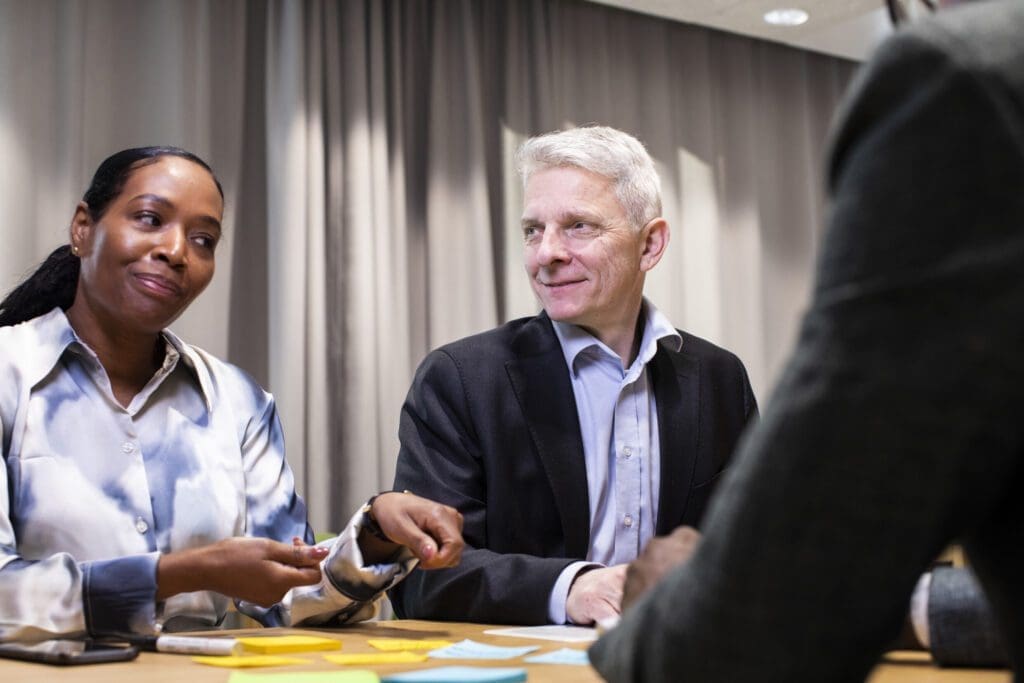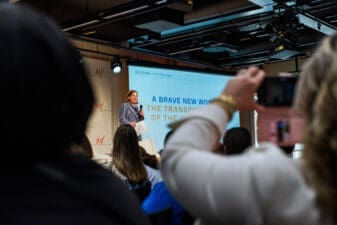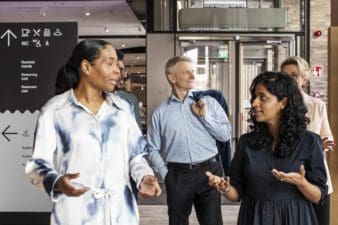What makes Helsinki one of the most innovative cities in the world?
Finland’s capital is fertile ground for research and commercialisation in sectors such as HealthTech, Artificial Intelligence, and Cyber Security. In fact, in 2022, the World Economic Forum ranked Helsinki as one of the top 25 most innovative cities in the world. But how does a relatively small city like Helsinki compete with heavyweights like San Francisco, London, and Tokyo?

5 min read
Looking to establish a business?
Set up your business in Finland and enter the European market through the Nordics – the easy way.
Finland has created many unicorns, from gaming giants Rovio and Supercell; to database management system MySQL and food delivery service Wolt – with the majority coming out of the capital region. In addition, Helsinki is home to one of the world’s leading startup events, Slush, which is held every year at the city’s Expo and Convention Center, Messukeskus. In fact, in 2022, the World Economic Forum ranked the Helsinki region among the top 25 most innovative cities in the world.
But how does a relatively small city like Helsinki compete with heavyweights like San Francisco, London, and Tokyo?
“Human talent is one huge benefit we have,” says Santtu von Bruun, Director of Innovation Ecosystems for the University of Helsinki. “This is a talent-driven ecosystem. Out of the 1.2 million people in the greater Helsinki area, we have 100,000 students and 15,000 researchers.” Education is highly respected in Finland, with over a third of people in Helsinki holding university degrees.
“Human talent is one huge benefit we have.”
Santtu von Bruun, Director of Innovation Ecosystems for the University of Helsinki
As a whole, the Finnish population is extremely digitally fluent. The Digital Economy and Society Index (DESI) ranked Finland number one in Europe in both digital skills and the availability of the latest technologies.
The city is also increasingly focused on attracting international talent. Some industries, such as ICT, have so many international experts that English is the default language in many companies. Helsinki recognises the importance of attracting international talent and nurturing innovation in the startup ecosystem through collaboration, diversification, and open-sourced data sharing.
Innovation through collaboration
“Another benefit we have is the collaborative innovation ecosystem,” von Bruun continues. “Innovation is carried out between corporations, startups and universities.”
This dynamic ecosystem has not gone unnoticed. The EU/Impact Assessment ranked Finland as the best in university-industry collaboration, but the partnership does not stop there.
“Investors are tightly connected to the innovation process. They often act more like accelerators and incubators instead of simply a source of capital,” says von Bruun. “We also can’t forget the supportive role of the Helsinki city.”
The public sector is eager to participate in pilot programmes and is an early adopter of new digital technologies. For example, Finland implemented the Aurora AI program, which uses machine learning to improve public services. The city of Helsinki has also facilitated a variety of innovation platforms, such as the Smart City Programme in the Kalasatama district and the entrepreneurial community Maria 01.
“Investors are tightly connected to the innovation process. They often act more like accelerators and incubators instead of simply a source of capital”
Santtu von Bruun, Director of Innovation Ecosystems for the University of Helsinki
Diversification as the key to innovation and market growth
Some of Helsinki’s most innovative sectors include the internet of things (IoT), big data, virtual reality, and 5G. Cyber security is another growing field, where Finland has ranked number one in Europe. Commercial innovations have led to strong growth in companies in a diverse array of industries such as gaming, smart cities, HealthTech, electronics, and software.
Quantum computing is also a field with cutting-edge research being conducted in Helsinki. VTT Research has a special programme to help organisations develop quantum technologies with the goal of creating profitable businesses. In particular, they focus on superconductors, semiconductors and silicon photonics. VTT is a state-owned research institution that has participated in several European Quantum Technology Flagship projects.
“We are particularly strong in AI innovation,” says von Bruun. “Corporate-university partnerships are often at the forefront of machine learning. The free Elements of AI course created by the University of Helsinki and their partners is popular all over the world.”
Another major proponent of AI Innovation is the Finnish Center for Artificial Intelligence (FCAI), a collaboration hub between international researchers and companies. It is a publicly funded institution which focuses on research on sustainable and ethical AI as a competitive advantage for Finland.
Fostering international partnerships
Roberta Gilardi is an expert in innovation ecosystems. She is the CEO of G-Gravity® based out of Milan, Italy. G-Gravity® is a physical and digital hub with a clear-cut vision: an Integrated Knowledge and Competence Center, a Community of Innovators, and an innovation layer dedicated to the corporate sectors as well as startup development with a vertical approach.
Gilardi came to Helsinki as part of the 90 Day Finn Programme, a unique initiative that invites entrepreneurs, investors, corporate executives, event organisers, tech talents from all over the world to live and find opportunities in Helsinki for three full months.
“One of my goals is to establish a bridge between the ecosystems in Italy and Finland,” she says. “We need more collaboration in Europe.” Gilardi specialises in several industries, such as Artificial Intelligence (AI) and HealthTech, but she isn’t just interested in the technology. She is also focused on the philosophy which drives innovation.
“AI research in Finland is not a slave to technology. Instead, the goal of the research is to find solutions to improve human life and happiness,” she says. “There are ethics behind the innovation. AI by itself is neither good nor bad; it is a neutral tool. We shouldn’t use technology without thinking about the good it can do for people.”
“AI research in Finland is not a slave to technology. Instead, the goal of the research is to find solutions to improve human life and happiness”
Roberta Gilardi, CEO of G-Gravity
“AI research in Finland is not a slave to technology. Instead, the goal of the research is to find solutions to improve human life and happiness,” she says. “There are ethics behind the innovation. AI by itself is neither good nor bad; it is a neutral tool. We shouldn’t use technology without thinking about the good it can do for people.”
Open-source data for innovation
Helsinki’s innovation ecosystem couldn’t thrive as it does without a supportive culture and regulations. For example, modern innovation requires abundant, reliable data. Finland has embraced the concept of open data. Avoindata is a service for open data and interoperability standards. The central government has opened up environmental and health data, while Helsinki has made public transport data available.
“Helsinki is an innovation hub for HealthTech,” says von Bruun. “Finland has unique high-quality health data going back decades if not centuries, and it is open to researchers. The central hospital system in Helsinki participates in medical and wellbeing innovation and incubator platforms. We have had many innovations commercialised already, but I almost want to say this is still an untapped ecosystem because we can still do so much more.”
“Helsinki is an innovation hub for HealthTech.”
Santtu von Bruun, Director of Innovation Ecosystems for the University of Helsinki
Gilardi agrees. She already has some ideas about what she hopes to accomplish in Helsinki’s innovation ecosystem during her time as a 90 Day Finn. “I’d like to build a cross-border initiative in healthtech,” she says. “I’d like to see Italian startups come to Finland to commercialise and scale from here. We can really do great things together!”
Are you interested in bringing your business to Helsinki?
Establish your business in Helsinki to access the EU market, join an innovative tech ecosystem in a value-driven society, and enjoy a famously excellent work-life balance. Experience business and life in the capital of the world’s happiest country.

Related articles
Contact Helsinki Partners
If you are interested in learning more about Helsinki and its possibilities – please contact us via the form here. We’ll make sure to get back to you within a few working days.


